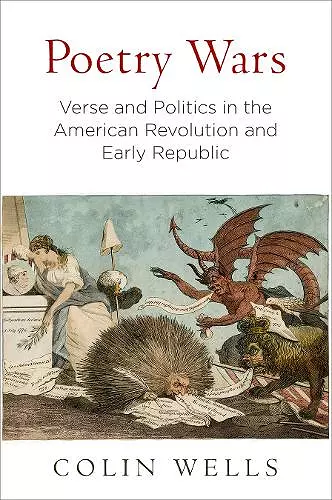Poetry Wars
Verse and Politics in the American Revolution and Early Republic
Format:Hardback
Publisher:University of Pennsylvania Press
Published:17th Nov '17
Currently unavailable, and unfortunately no date known when it will be back

The pen was as mighty as the musket during the American Revolution, as poets waged literary war against politicians, journalists, and each other. Drawing on hundreds of poems, Poetry Wars reconstructs the important public role of poetry in the early republic and examines the reciprocal relationship between political conflict and verse.
During America's founding period, poets and balladeers engaged in a series of literary "wars" against political leaders, journalists, and each other, all in the name of determining the political course of the new nation. Political poems and songs appeared regularly in newspapers (and as pamphlets and broadsides), commenting on political issues and controversies and satirizing leaders like Thomas Jefferson and Alexander Hamilton. Drawing on hundreds of individual poems—including many that are frequently overlooked—Poetry Wars reconstructs the world of literary-political struggle as it unfolded between the Stamp Act crisis and the War of 1812.
Colin Wells argues that political verse from this period was a unique literary form that derived its cultural importance from its capacity to respond to, and contest the meaning of, other printed texts—from official documents and political speeches to newspaper articles and rival political poems. First arising during the Revolution as a strategy for subverting the authority of royal proclamations and congressional declarations, poetic warfare became a ubiquitous part of early national print culture. Poets representing the emerging Federalist and Republican parties sought to wrest control of political narratives unfolding in the press by engaging in literary battles.
Tracing the parallel histories of the first party system and the rise and eventual decline of political verse, Poetry Wars shows how poetic warfare lent urgency to policy debates and contributed to a dynamic in which partisans came to regard each other as threats to the republic's survival. Breathing new life into this episode of literary-political history, Wells offers detailed interpretations of scores of individual poems, references hundreds of others, and identifies numerous terms and tactics of the period's verse warfare.
"With his comprehensive study of political poetry from the American Revolution through the War of 1812, Colin Wells foregrounds a body of writing not often given extended treatment by literary scholars, but one which, as he superbly demonstrates, played an influential role in shaping the cultural and political landscape of the nation's turbulent, but formative, early years . . . Poetry Wars unearths a trove of poems published in partisan newspapers and other print outlets to reveal the intricate ideological and rhetorical dy-namics at work in the political debates that shaped the new nation and the active role that poetry played in them. [Wells] therefore makes a persuasive case that poetry, despite W. H. Auden's later assertion to the contrary, does, in fact, make things happen." * Early American Literature *
"Poetry Wars explains the explosion of printed verse at the end of the eighteenth century in America and the evolution of several strands of political consciousness articulated through poetry. Arguing that poetry, not prose, was in fact the dominant belletristic mode of expression in the early United States, Colin Wells provides an important corrective to our understanding of American literary history." * David Shields, University of South Carolina *
"Poetry Wars offers an erudite and engaging account of the surprisingly instrumental role of verse in U.S. nation formation. Colin Wells gives us a sense of how bold, playful, and rhetorically incisive political poems could be. He has done literary history a great service by recovering a time when poetry was both a vital force in public life and a dynamic means of effecting political change." * Edward Cahill, Fordham University *
ISBN: 9780812249651
Dimensions: unknown
Weight: unknown
352 pages